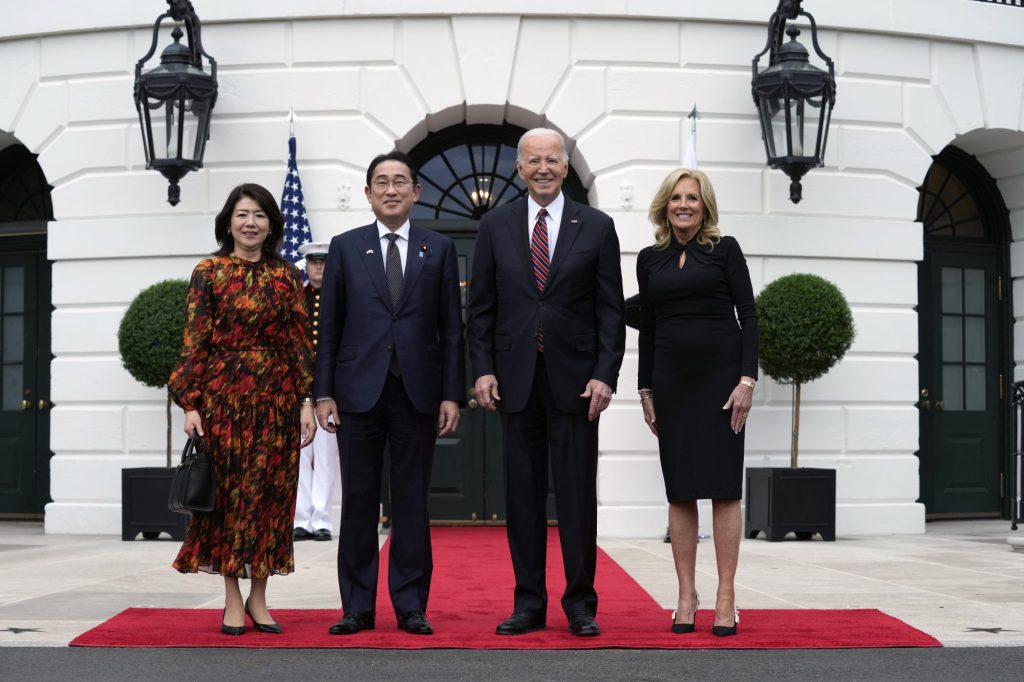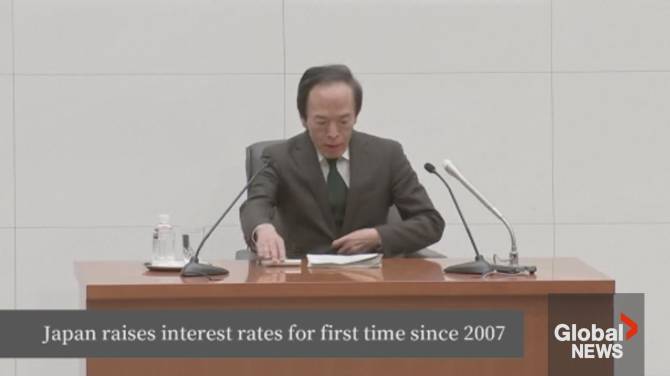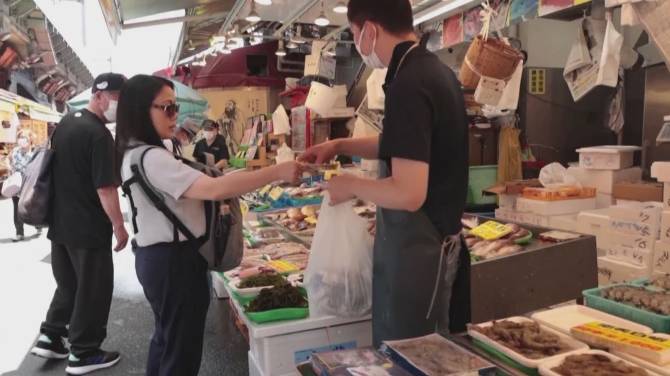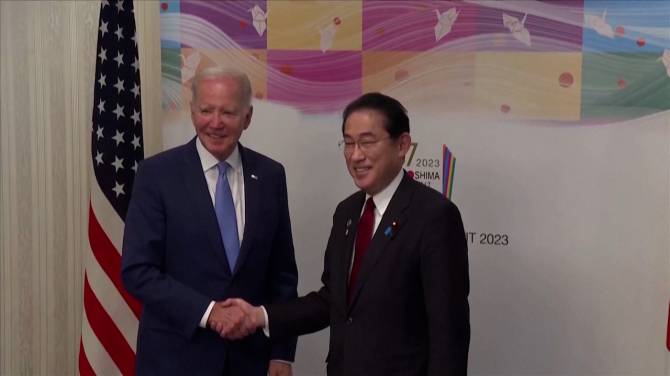Japanese Prime Minister Fumio Kishida started a highly anticipated visit to Washington on Tuesday. The visit highlights common worries about provocative Chinese military actions in the Pacific and an unusual moment of public disagreement between the two countries over a Japanese company’s plan to purchase a well-known U.S. company.
Kishida and his wife will visit the White House on Tuesday evening before the official visit and formal state dinner on Wednesday. President Joe Biden intends to honor a long-time ally, which he sees as the foundation of his Indo-Pacific policy. Kishida will be the fifth world leader to receive a state dinner from Biden since the start of his term in 2021.
Prior to the White House visit, Kishida laid a wreath at Arlington National Cemetery on Tuesday and visited the U.S. Chamber of Commerce, where he met with Microsoft’s vice chairman and president, Brad Smith. On Wednesday, Biden and Kishida will have discussions and participate in a joint news conference before Biden hosts a state dinner for the Japanese leader in the East Room.
The prime minister has also been invited to speak at a joint meeting of Congress on Thursday. He will be only the second Japanese leader to address the body since Shinzo Abe gave a speech to Congress in 2015.
The visit comes after Biden declared last month that he opposes the planned sale of Pittsburgh-based U.S. Steel to Nippon Steel of Japan, revealing a significant disagreement in the partnership at a critical time when the two leaders aim to strengthen it. Biden justified his opposition by stating that the U.S. needs to “support strong American steel companies run by American steelworkers.”
Ambassador Rahm Emanuel, Biden’s representative to Tokyo, tried to play down the impact of Biden’s rejection of the U.S. Steel acquisition on the relationship. Emanuel mentioned that in February, the Biden administration approved a plan that would generate billions of dollars in revenue for a U.S.-based branch of the Japanese company Mitsui for crane production in the United States.
“The United States' relationship with Japan is much more profound, robust, and meaningful than a single business deal,” said Emanuel, the former mayor of Chicago, during a joint appearance at Washington’s Center for Strategic and International Studies with Japan’s top envoy to Washington. “As we would say in Chicago, you got to chill.”
Nippon Steel announced in December that it intended to acquire U.S. Steel for $14.1 billion in cash, raising concerns about what the deal could mean for unionized workers, supply chains, and U.S. national security. Shigeo Yamada, Japan’s ambassador to Washington, declined to comment on whether Kishida would address the Nippon-U.S. Steel deal with Biden.
During his visit to the U.S. Chamber, Kishida mentioned that mutual investments between the U.S. and Japan would create interconnected and inseparable economies. Smith, the Microsoft vice chairman, stated that the tech company would invest $2.9 billion in Japan over the next two years to expand its cloud computing and artificial intelligence operations there. Microsoft will collaborate with the Japanese government to enhance its cybersecurity capabilities.
Smith said that they view this as a very important investment in every Japanese company they support and also in the Japanese government.
Biden has tried to focus more on foreign policy in the Pacific despite dealing with the aftermath of the Russian invasion of Ukraine and the Israel-Hamas conflict. Last year, Biden brought together Kishida and South Korean President Yoon Suk Yeol at the presidential retreat at Camp David, Maryland, a historic meeting between leaders of two countries with a complex shared history.
Biden has shown respect for Yoon by hosting a state visit and chose Kishida’s predecessor, Prime Minister Yoshihide Suga, as the first foreign leader to visit him in person since becoming president.
The administration is pleased with Japan’s strong support for Ukraine. Tokyo has been one of the largest donors to Kyiv since Russia’s invasion in February 2022, and Japan has increased its defense spending due to concerns about China’s aggressive military stance.
Yamada suggested that Kishida would emphasize Japan’s support for Ukraine during his appearance before Congress, and explain why the conflict in Eastern Europe is important to his country. Biden is having difficulty getting House Republicans to support his proposal to send an additional $60 billion to Kyiv as it tries to resist Russia.
Kishida has cautioned that the conflict in Europe could lead to conflict in East Asia, indicating that a lenient approach to Russia emboldens China.
“The prime minister’s belief is that today’s situation in Ukraine could become tomorrow’s issue in East Asia,” Yamada said.
The Pentagon announced on Monday that the U.S., United Kingdom, and Australia are considering bringing Japan into the AUKUS partnership, a group established in 2021 that aims to provide Australia with nuclear-powered and conventionally-armed submarines.
Beijing has criticized the AUKUS pact, claiming that it promotes division and could lead to military conflict in the region. China’s foreign ministry objected to Japan’s potential new role on Tuesday.
Kishida will stay in Washington on Thursday to participate in a meeting with Biden and Philippine President Ferdinand Marcos Jr. Relations between the Philippines and China have been repeatedly strained by clashes between the two nations’ coast guard vessels in the contested South China Sea.
Chinese coast guard ships also frequently approach disputed Japanese-controlled East China Sea islands near Taiwan. Beijing asserts that Taiwan is part of its territory and will be brought under control by force if necessary.
“Cooperation among our three countries is extremely important in maintaining peace and stability in the Indo-Pacific region and in defending a free and open international order based on the rules of law,” Kishida said Monday before leaving for Washington.
The leaders are expected to discuss plans to upgrade the U.S. military command structure in Japan. There are about 54,000 U.S. troops stationed in Japan.
White House national security adviser Jake Sullivan said that the leaders' announcements on defense will allow “greater coordination in the integration of our forces and ensure that they are optimally postured and linked to other like-minded partners.”
Kishida and Biden are expected to also confirm that Japan will take part in NASA’s Artemis moon program and provide a moon rover made by Toyota Motor Corp. They will also discuss the involvement of a Japanese astronaut in the mission. The rover, which will cost approximately $2 billion, will be the priciest contribution from a non-U.S. partner to the mission so far.






